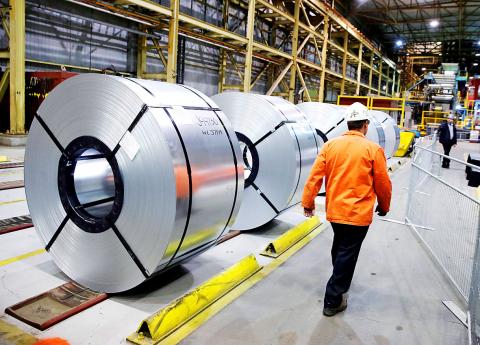Canadian government funding for ArcelorMittal is the first of a series of steps the nation is to take to support the steel industry amid a tariff fight with the US, Canadian Minister of Innovation, Science and Economic Development Navdeep Bains said on Friday.
The ministry announced funding of up to C$49.9 million (US$38 million), a mix of grants and loans, as part of a C$205 million modernization project at the Hamilton, Ontario, plant of the Luxembourg-based steelmaker’s Canadian unit, ArcelorMittal Dofasco.
It was the first announcement from a C$250 million fund unveiled earlier this year to support steel, aluminum and manufacturing companies affected by the tariff standoff and more are coming, Bains said.

Photo: Reuters
He left the door open to Canada accepting quotas on metal exports, but said US tariffs must be eliminated.
“It’s a priority for us to eliminate the tariffs on aluminum and steel, so we’re very engaged with our American counterparts,” Bains said in a telephone interview. “Today’s announcement really demonstrates a commitment to the steel industry and steel workers.”
The US imposed import tariffs of 25 percent on Canadian steel and 10 percent on aluminum as of June 1, and Canada responded in kind a month later with its own tariffs. Despite a Sept. 30 deal to update the North American Free Trade Agreement (NAFTA), the metals tariffs remain in place.
Canada accepted a quota on tariff-free auto shipments as part of the trade deal and a similar solution is seen by some as the likely answer to the metals tariffs.
Bains would not rule out a quota when asked repeatedly whether Canada would accept that as an alternative to tariffs — even one like the auto sector, which is largely symbolic and well above current production.
He said that Canada’s focus remained on eliminating the tariffs.
After the NAFTA deal, “let’s use the goodwill and momentum going forward to ultimately eliminate the tariff,” Bains said.
“We’re making the business case and the economics of it are very compelling,” he said.
Canada has regularly said its preference is for both countries to simply eliminate their tariffs.
When the Canadian government finalized its retaliatory tariffs in June, it announced C$250 million for the steel, aluminum and manufacturing sectors affected by the tariff fight.
Friday’s announcement came from that fund and more announcements are to follow and potentially top C$250 million.
“Absolutely, we will be making additional announcements in the coming weeks and months. This fund is oversubscribed,” Bains said.

With an approval rating of just two percent, Peruvian President Dina Boluarte might be the world’s most unpopular leader, according to pollsters. Protests greeted her rise to power 29 months ago, and have marked her entire term — joined by assorted scandals, investigations, controversies and a surge in gang violence. The 63-year-old is the target of a dozen probes, including for her alleged failure to declare gifts of luxury jewels and watches, a scandal inevitably dubbed “Rolexgate.” She is also under the microscope for a two-week undeclared absence for nose surgery — which she insists was medical, not cosmetic — and is

CAUTIOUS RECOVERY: While the manufacturing sector returned to growth amid the US-China trade truce, firms remain wary as uncertainty clouds the outlook, the CIER said The local manufacturing sector returned to expansion last month, as the official purchasing managers’ index (PMI) rose 2.1 points to 51.0, driven by a temporary easing in US-China trade tensions, the Chung-Hua Institution for Economic Research (CIER, 中華經濟研究院) said yesterday. The PMI gauges the health of the manufacturing industry, with readings above 50 indicating expansion and those below 50 signaling contraction. “Firms are not as pessimistic as they were in April, but they remain far from optimistic,” CIER president Lien Hsien-ming (連賢明) said at a news conference. The full impact of US tariff decisions is unlikely to become clear until later this month

GROWING CONCERN: Some senior Trump administration officials opposed the UAE expansion over fears that another TSMC project could jeopardize its US investment Taiwan Semiconductor Manufacturing Co (TSMC, 台積電) is evaluating building an advanced production facility in the United Arab Emirates (UAE) and has discussed the possibility with officials in US President Donald Trump’s administration, people familiar with the matter said, in a potentially major bet on the Middle East that would only come to fruition with Washington’s approval. The company has had multiple meetings in the past few months with US Special Envoy to the Middle East Steve Witkoff and officials from MGX, an influential investment vehicle overseen by the UAE president’s brother, the people said. The conversations are a continuation of talks that

CHIP DUTIES: TSMC said it voiced its concerns to Washington about tariffs, telling the US commerce department that it wants ‘fair treatment’ to protect its competitiveness Taiwan Semiconductor Manufacturing Co (TSMC, 台積電) yesterday reiterated robust business prospects for this year as strong artificial intelligence (AI) chip demand from Nvidia Corp and other customers would absorb the impacts of US tariffs. “The impact of tariffs would be indirect, as the custom tax is the importers’ responsibility, not the exporters,” TSMC chairman and chief executive officer C.C. Wei (魏哲家) said at the chipmaker’s annual shareholders’ meeting in Hsinchu City. TSMC’s business could be affected if people become reluctant to buy electronics due to inflated prices, Wei said. In addition, the chipmaker has voiced its concern to the US Department of Commerce